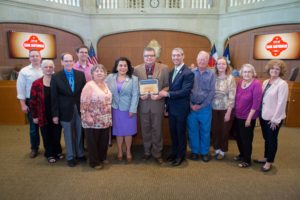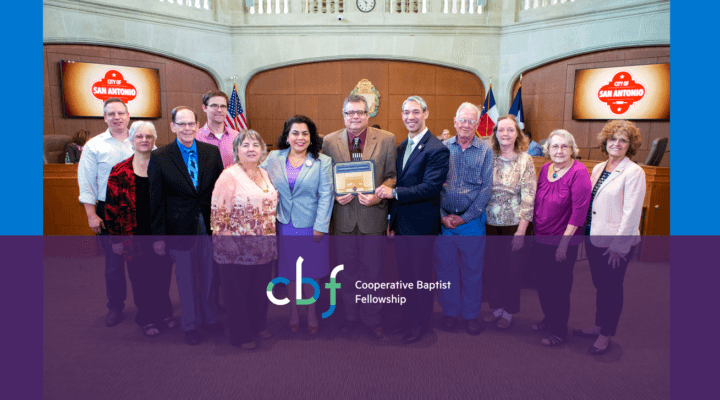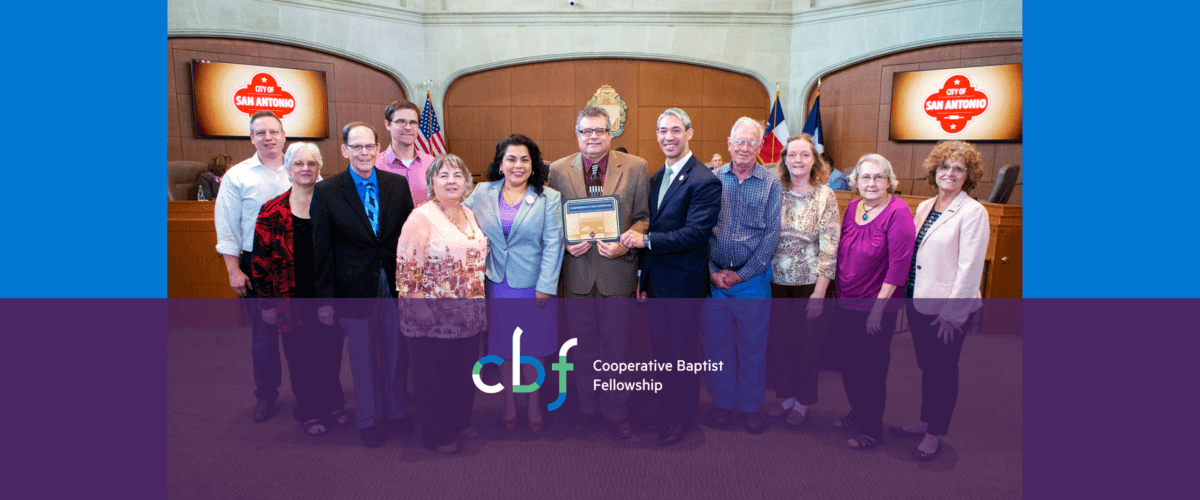By Blake Tommey
Pastor Jorge Zayasbazan is a child of the 1970s, which means he remembers the first Earth Day. “My generation was raised to understand creation care, though we didn’t call it that in 1970,” he said. Indeed, the counterculture movement reached a fever pitch in 1969, and cries for peace and racial justice gave voice to an emerging consciousness about the environment and humanity’s role in protecting it.
On April 22 the following year, 20 million Americans took to the streets, parks and auditoriums to call for a healthy, sustainable environment and force environmental protection onto the nation’s political agenda.
Nearly fifty years later, Earth Day is just another day for Zayasbazan and his congregation at Baptist Temple in San Antonio, Texas, which has committed to making the church’s operations sustainable for the environment 365 days a year, said Zayasbazan. Baptist Temple is a congregation deeply invested in the life of the Cooperative Baptist Fellowship as a CBF Global Missions engagement partner as well as a host to CBF church starters.

Baptist Temple and Jorge Zayasbazan (center) recently received the Compassionate San Antonian Award from San Antonio Mayor Ron Nirenberg for the innovative ways the congregation has used its inner-city campus to serve the spiritual and physical needs of the community. These services include a PK4-8th grade charter school, an infant-5 years early learning center, a thrift store and food pantry, a prison ministry, performing arts ministry, crafts classes, support groups, counseling and more. Photo courtesy of The City of San Antonio.
“Every day is Earth Day here; everything we do at Baptist Temple heightens our awareness of the environment and of one another,” he explained. “Sometimes the church has felt itself separate from things like this. You know, the church isn’t a business or corporation, and it hasn’t been mindful of its impact. So, our church is heightening its mindfulness.”
Eight years ago, Baptist Temple began where many congregations begin—with mounting garbage. Baptist Temple was throwing away mountains of cardboard every week, not to mention cans and plastics, so the church acquired its first recycling bin. Now, the bin is practically overflowing by Friday afternoon ahead of recycling collection on Tuesday.
Later in 2016, as Zayasbazan was researching sustainable practices for his own home, he encountered an organization that leases commercial rooftops to produce solar energy for CPS, a local energy company. Baptist Temple had just replaced its roof and was a prime candidate for partnership, Zayasbazan explained, so he brought the idea forward. The company would install and maintain the solar panels with no cost to the church. Moreover, the church would receive 3 cents per kilowatt hour back on its utility bill in exchange for hosting the panels. The church overwhelmingly approved the installation.
Baptist Temple’s savings now amount to $600 a month during the summer and $200 during the winter, a significant boon to the church’s budget, Zayasbazan said. More importantly, however, the church is helping move the needle towards renewable energy, which, he emphasized, is part of our God-given calling.
“We are stewards of everything that God gave us,” Zayasbazan said.
“In the book of Genesis, we find that the first job God gave humans was to tend the garden, to take care of creation. God created everything and said it was good, and our first job was to care for it. This is just what we do. Just like we wash our cars, clean our houses or take a shower, we keep our local environment clean and make sure everything keeps running well.”
In addition to recycling and renewable energy, Baptist Temple continues to hone other sustainable practices, Zayasbazan said, including sharing their 8,000-square-foot facility just off Interstate-10.
“Even if we were a large church—and we’re a church of 100—we just couldn’t use it all,” he added. “So, we try to use every bit of space, because you can’t turn off the air conditioning.” That’s why Baptist Temple shares their building with six other churches as well as a charter school and daycare center during the week, all of whom share lighting, air conditioning and recycling services. While Baptist Temple isn’t full 24/7, Zayasbazan said, it is full 7 days a week and at least 12 hours a day.
This summer, Baptist Temple will begin their next phase—a fundraising campaign to tear out the church’s high-maintenance landscaping and replace it with stone and succulents. Water conservation is a vital part of living in San Antonio, Zayasbazan explained, and a new, water-retaining landscape will drastically cut Baptist Temple’s footprint. Besides, he said, the smaller the church’s impact on the environment, the closer our country comes to reversing the destructive effects of climate change.
“I believe that we’re sending a message, a message that we care for our environment, that the church cares for our environment and that other churches and institutions can easily take these steps too,” he said. “Not to mention, we’re making a little money doing it. But ultimately, climate change poses tremendous consequences, both environmental and political, and we’re helping our community turn the corner on those. Environmental justice must become a byproduct of everything we do.”
The Cooperative Baptist Fellowship is a Christian Network that helps people put their faith to practice through ministry efforts, global missions and a broad community of support. The Fellowship’s mission is to serve Christians and churches as they discover and fulfill their God-given mission. Learn more at www.cbf.net.


